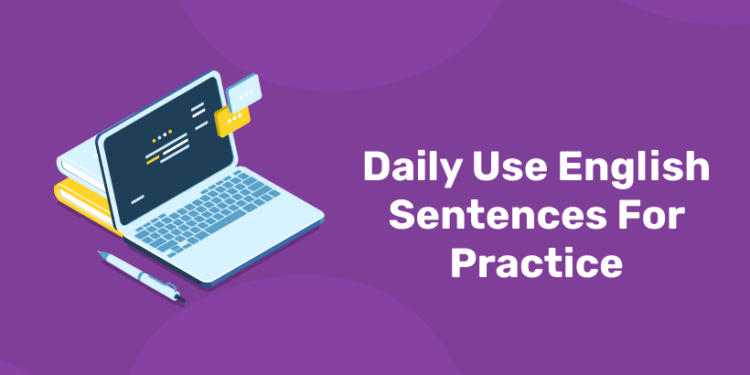Table of Contents
English is a widely spoken language all over the globe, people use basic spoken sentences every day in their lives. From greeting someone to saying goodbye, there are several daily uses of English sentences in speaking.
Anyone can use this foreign language in their daily life with some simple direction. There is nothing to stress about if you get stuck somewhere where you have to speak this foreign language English. Here are some fundamental English sentences that anyone can speak and understand. Check this out and begin practicing this in your daily life for better speaking. English Sentences for Daily Use are mentioned below:
Useful Sentences for Daily Spoken English Use
- Believe me.
- Call me back.
- As soon as possible
- Do me a favor
- Give me a hand
- I do not understand
- I do not mean it
- I decline!
- I’m on a diet
- I just made it
- I’m sorry
- Absolutely not.
- I have no idea.
- I agree.
- I’m at home
- It’s on the tip of my tongue actually
- It’s ok
- It really takes time
- It’s for the best
- No, I don’t want
- See you
- See you next time
- So I do
- So so
- Allow me
- Any day will do
- Be calm
- Be careful!
- Be quiet!
- Cheer up!
- Come on
- Don’t be ridiculous
- Don’t be so childish
- Don’t move!
- Don’t worry
- Enjoy yourself
- Follow me
- Forgive me
- Forget it
- God bless you
- It’s very thoughtful of you
- It’s up to you
- It’s none of your business
- Shut up
- Slow down
- Stop making such a noise
- You are going too fast
- Come with me
- Good afternoon
- Good morning
- Good night
- Have a good trip
- Have a good weekend
- I admire you
- I apologize
- I can’t wait
- I don’t have time
- I got it.
- I hate you!
- I hope so.
- I knew it.
- I love you.
- I would love to.
- I am busy.
- I am tired.
- I don’t agree.
- You are wasting my time.
- I feel much better.
- They like each other.
- I’m sorry.
- I’m good.
- It doesn’t matter.
- Join me.
- Let’s catch up!
- Let’s do it.
- Nice to meet you.
- Not yet.
- Talk to you tomorrow.
- Thank you very much.
- You turn.
Want to Learn Common Phrases for Daily Use? Sign Up for ENTRI Learning App!
English Conversation Sentences for Everyday Use
The words which are used in daily life are not very crucial or something just out of the dictionary. Rather, daily used English words are very simple and effortless to understand as well as speak.
Hello
Good morning/ afternoon/ evening based on the time of the day.
How are you?
How are you doing?
How do you do?
It’s a pleasure to meet you.
It’s nice to meet you
Nice to meet you
I’m pleased to meet you.
I’m glad to see you.
English Conversation Sentences for Casual Greeting
Hi/ Hey
What’s up?
How’s it going on?
How are things?
How’s your day going?
How have you been?
How’s your day?
Good to see you.
Sentences for Daily Use when Responding to Greetings
I’m doing very well, thank you. And you?
Great, thanks. How are you?
I’m fine, thank you.
Wonderful, thank you.
Daily Conversation Sentences in English for Introduction
Hello. My name is …
Let me introduce myself. I’m …
Nice to meet you. I’m …
May I introduce myself? I’m…
I’d like to introduce myself. I’m …
It’s a pleasure to see you. I’m…
Pleased to meet you. I’m …
Daily Used English Words for Introducing Others
Ted, have you met Simpson?
Ket, meet Ted. Ted, this is Ket.
Mary, please meet Simpson
Daily Conversation Sentences in English for Expressing Gratefulness
Different than saying, thanks and thank you, there are several other words for saying your gratitude. Following are some of those:
I really appreciate your help.
There are no words to reveal my appreciation!
Thanks a million for your help.
I owe you a great deal.
What you’ve done means a lot to me.
Thank you from the bottom of my heart for everything you have done.
That’s so kind of you.
How can I ever possibly thank you?
English Conversation Sentences for Responding to Someone’s Thanks
I’m glad that I can help you.
No big deal.
It was my pleasure.
My pleasure.
You’re welcome.
You’re always welcome.
Want to Know How to Practice English Speaking? Sign Up for ENTRI Learning App Now!
English Conversation for Daily Use for Congratulating
Congratulations! You deserve it!
Amazing! Congratulations.
I would like to congratulate you on …
That was excellent. Congratulations!
Daily Used English Words in Reaction to Congratulations
It’s very kind of you.
Thank you/ Thanks/ Thank you so much.
Thank you for your kindness.
Thanks for your kind words.
Giving Good News in Easy Words
I’m really pleased to tell you…
I’ve brought some good news for us…
I’m so excited to share with you that
I’m very pleased to tell you that.
Replying to Good News
This sounds great!
Wonderful! Thank you for sharing.
Wow! I can’t believe that!
I’m so glad to hear that!
Giving Bad News in Easy English Sentences
I know this isn’t what you wish to hear but…
I’m so sorry but…
I really don’t know how to say it, but…
I’m afraid to inform you of…
It is my unfortunate chore to tell you that…
Replying to Bad News Using Basic Sentences
That’s awful!
Anytime you expect to talk, just call me…
I’m sorry to hear that…
Sorry to hear that. Accept my deepest sympathy.
Spoken English Sentences Used Every Day for Making Appointments
Do you have any time available this week?
Would the day after tomorrow be all right for you?
Are you available on the 6th?
Can you give me an appointment on Tuesday?
Let’s meet this weekend.
Basic English Sentences for Receiving an Appointment
Thursday would be perfect – Change the day as required.
Sure. I’ll come.
I’ll be there at that time.
Yes, that date is okay with me.
Easy Sentences for Rejecting an Appointment
I’m sorry to say but I can’t meet this Sunday.
Sorry. I don’t think I can make it in the evening.
Sorry. I have another session at that time.
General Conversation
Can you give me your laptop bag? (Daily use)
Could you please give me your laptop pack? (Official use)
Sign Up for ENTRI Learning App to Know How to Begin a Conversation in English!
Daily Conversation Basic Tips
1: Which of the sentences below is grammatically correct?
Speaking is The Nice Way to Learn
Speaking is one thing you must do always. Hyperpolyglots learn a language by speaking as much as feasible right away. Don’t wait till you think your level is fair. Even if your English is slow and essential, start speaking with other people right away.
Also, focus on fluidity and don’t be too concerned with making mistakes. You’ll slowly fix them, but don’t delay speaking because you’re afraid of making a mistake.
Use a Sort of Resources
Today, there is an overload of tools available to help you learn English, including applications like ENTRI. Sites like this can help you a lot in your spoken English practice.
Make advantage of the many resources you have at your disposal and connect them in a way that works for you. Experimentation with different applications, podcasts, movies, articles, and courses. However, experiment and see what performs best for you.
Set Goals and Work on Them regularly
Don’t just function a bunch of random English activities now. It’s a variety of activities to watch Game of Thrones, listen to the news while driving to work, and write notes in English, but there’s no method.
Setting objectives and functioning toward them regularly will help you learn more effectively. This gets you motivated, and your progress motivates you to keep going until it becomes second nature. Set your objectives, very clear goals, and then plan how you’ll get there, one step at a time.
Make a Plan for Your Practise
There is a combination of strategies that can help you become fluent, including memorizing chunks (fixed gestures), solving from your native language to English and back, occlusions to improve pronunciation, learning mnemonic devices to remember vocabulary better, and distance revision training so that the vocabulary stays fresh in your mind till it becomes completely automated.
You can rush your success by being strategic, rather than just doing odd stuff in English, with good resources, discipline, and possibly even a trainer to advise you. Remember that learning what works best for you needs a while.
The above-mentioned basic English sentences are generally used in our daily conversations. If you were looking for how to improve English for use in day-to-day life, assumably you have got all your answers by now. You can use these in the needed situations. To gain a better grasp of it, try listening to other people using these sentences. Observe their tone and pronunciation.
So that now you know how to use English sentences for daily use, you should plan to begin practicing these. It is a good idea to join our Spoken English course “English Padikkyam with Inverted Coconut” by Aparna Mulberry for a better English Learning. Sign Up now to register.












